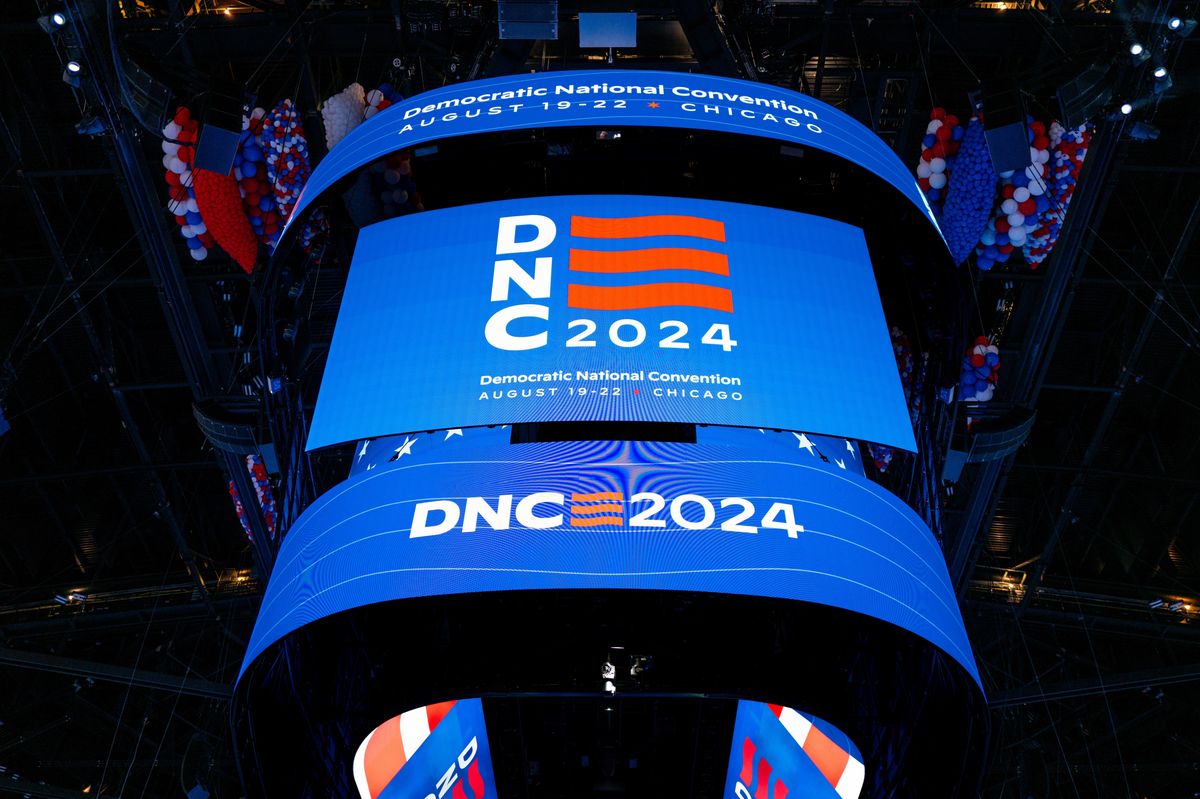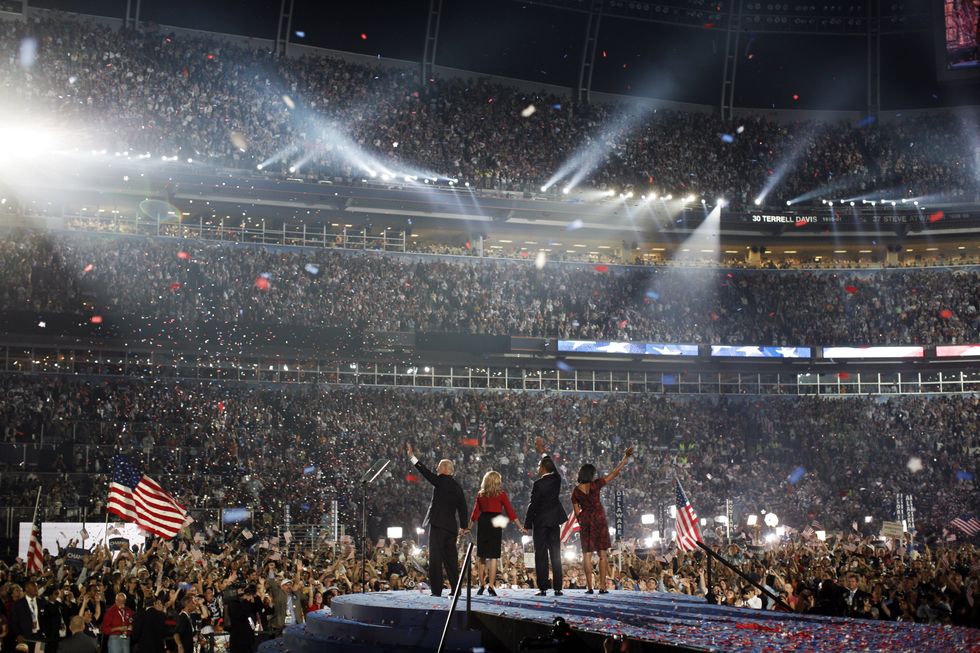John A. Tures
August 17, 2024 7:02AM ET

A scoreboard displays "DNC 2024" ahead of the Democratic National Convention at the United Center on Aug. 16, 2024 in Chicago. The United Center will host the Democratic National Convention, which is officially scheduled to kick off on Monday, August 19, and run through Thursday, August 22. (Photo by Brandon Bell/Getty Images)
This article was paid for by Raw Story subscribers.
As Democrats converge on Chicago in what appears to be an organized show of unity at their 2024 convention, it’s a far cry from what transpired 100 years ago in New York City.
There and then, the Democratic party fielded 16 presidential candidates and conducted 103 ballots votes for a nominee. Battles raged over whether the party should insert a platform plank condemning the KKK. A delegate allegedly quipped, “We’re either going to have to pick a candidate tonight or a cheaper hotel.”
The New Republic reported that the event that occurred just before the Democratic National Convention that year in Madison Square Garden was the Barnum and Bailey Circus. Attendees of the 1924 Democratic National Convention probably couldn’t tell the difference between their event and the ones with clowns and dancing bears.
Even in our age of sanitized, made-for-TV national political conventions, where organizers do their best to promote unity and quell dissent, there’s always the possibility of flashpoints — internal or external — when thousands of delegates descend upon a city.
Countering Democrats’ exercise in comity this year is like to be a series of pro-Palestinian protests. Here, on the weekend before the convention begins, there’s no predicting whether these protests will be peaceful — or less than peaceful. Visions of Chicago in 1968, where anti-war protesters battled Chicago police in the streets, loom large.
But Chicago is no political convention rookie. In fact, Chicago has hosted 25 national political conventions over our nation’s history — 15 more than the next closest city, Baltimore.
In 14 of these 25 cases, Chicago’s winner has gone on to win the presidency — a 56 percent success rate.
On balance, Chicago has been kind to both parties. The GOP has hosted 14 national conventions in Chicago (with their presidential nominee winning eight) while Democrats opted to hold their party convention in Chicago 11 times (winning six).
The second most popular site for a national political convention is Baltimore.
But all but one (1912) took place in the 1800s, when Baltimore was one of the largest cities in America. In 1831, the first political party convention occurred. It was in Baltimore, put on by the Anti-Masonic League, and nominated William Wirt. Whigs and Democrats soon followed suit later that year and in 1832. In 1860, when the Democratic Party fractured in Charleston, S.C., Northern Democrats fled to Baltimore to nominate Sen. Stephen Douglas.
Philadelphia is the site of the third most political conventions in American history — nine. A little more than half of these conventions led to success in November.
Surprisingly, New York City has only hosted six, with three producing a win. Holding fifth place for convention sites is St. Louis, with five (only two nominees at those events won). San Francisco has held four conventions, with a party winning only one of those. Kansas City has only led to victory as a national convention site in one of three elections.
Six cities have hosted at least one convention and never yielded a winner Atlanta, Boston, Charleston, Houston, Minneapolis/St. Paul and Tampa.
Houston, which has lost twice before, is slated to host the GOP convention in 2028.
The smallest city to host a convention, by population rank at the time of the census, is Atlantic City, N.J. (1964), followed by Tampa (2012), Minneapolis/St. Paul (2008), Cleveland (2016) and Miami Beach (1968, and 1972 twice).
Atlantic City (1964), Dallas (1984), Detroit (1980), and New Orleans (1988) have won their solo shot at a convention.
So has Milwaukee in 2020 for the Democrats, although that largely virtual convention was decidedly unconventional given the COVID-19 pandemic. We’ll see what happens for the Republicans in 2024, as Milwaukee hosted their national convention last month.
Miami Beach, Cleveland, and Cincinnati have also fared well, with each being a successful site in two of three elections. Denver and Los Angeles have each won half of their convention host years.

Then-Democratic presidential nominee Sen. Barack Obama (D-IL) with running mate U.S. Sen. Joe Biden (D-DE), Michelle Obama, Jill Biden, and daughters Malia and Sasha on day four of the Democratic National Convention (DNC) at Invesco Field at Mile High August 28, 2008 in Denver, Colo. (Photo by Charles Ommanney/Getty Images)
Bottom line for bigger cities as convention sites?
During the last 12 elections, the convention that’s been conducted in the bigger city has won eight of them. Overall, in a head-to-head comparison, the bigger convention city has nominated an eventual presidential winner 21 times, while the smaller city has prevailed 15 times. (In six cases, both parties held their convention in the same city in the same year.)
This history bodes well for the Democrats, whose 2024 convention city (Chicago) is larger than the 2024 Republican host city (Milwaukee).
For the record, the largest cities never to host a convention are Phoenix, followed by San Antonio, Texas; San Jose, Calif.; Jacksonville, Fla.; Indianapolis; Austin, Texas; Columbus, Ohio; Ft. Worth, Texas; El Paso, Texas; Memphis, Tenn.; and Seattle. (Jacksonville did play an odd and ill-fated role during the 2020 election, however.)
Numerous factors go into the success — or lack thereof — of a presidential candidate. But if they want a historical tailwind at their backs, Democrats and Republicans both may want to consider city size when making their choice for their convention site for 2028.
Given the track record for the larger city, perhaps Los Angeles, New York City or yet another return to Chicago might be the better option in four years, although that probably doesn’t mean a cheaper hotel room.
John A. Tures is a professor of political science at LaGrange College in LaGrange, Georgia. His views are his own. He can be reached at jtures@lagrange.edu. His “X” account is JohnTures2.
There and then, the Democratic party fielded 16 presidential candidates and conducted 103 ballots votes for a nominee. Battles raged over whether the party should insert a platform plank condemning the KKK. A delegate allegedly quipped, “We’re either going to have to pick a candidate tonight or a cheaper hotel.”
The New Republic reported that the event that occurred just before the Democratic National Convention that year in Madison Square Garden was the Barnum and Bailey Circus. Attendees of the 1924 Democratic National Convention probably couldn’t tell the difference between their event and the ones with clowns and dancing bears.
Even in our age of sanitized, made-for-TV national political conventions, where organizers do their best to promote unity and quell dissent, there’s always the possibility of flashpoints — internal or external — when thousands of delegates descend upon a city.
Countering Democrats’ exercise in comity this year is like to be a series of pro-Palestinian protests. Here, on the weekend before the convention begins, there’s no predicting whether these protests will be peaceful — or less than peaceful. Visions of Chicago in 1968, where anti-war protesters battled Chicago police in the streets, loom large.
But Chicago is no political convention rookie. In fact, Chicago has hosted 25 national political conventions over our nation’s history — 15 more than the next closest city, Baltimore.
In 14 of these 25 cases, Chicago’s winner has gone on to win the presidency — a 56 percent success rate.
On balance, Chicago has been kind to both parties. The GOP has hosted 14 national conventions in Chicago (with their presidential nominee winning eight) while Democrats opted to hold their party convention in Chicago 11 times (winning six).
The second most popular site for a national political convention is Baltimore.
But all but one (1912) took place in the 1800s, when Baltimore was one of the largest cities in America. In 1831, the first political party convention occurred. It was in Baltimore, put on by the Anti-Masonic League, and nominated William Wirt. Whigs and Democrats soon followed suit later that year and in 1832. In 1860, when the Democratic Party fractured in Charleston, S.C., Northern Democrats fled to Baltimore to nominate Sen. Stephen Douglas.
Philadelphia is the site of the third most political conventions in American history — nine. A little more than half of these conventions led to success in November.
Surprisingly, New York City has only hosted six, with three producing a win. Holding fifth place for convention sites is St. Louis, with five (only two nominees at those events won). San Francisco has held four conventions, with a party winning only one of those. Kansas City has only led to victory as a national convention site in one of three elections.
Six cities have hosted at least one convention and never yielded a winner Atlanta, Boston, Charleston, Houston, Minneapolis/St. Paul and Tampa.
Houston, which has lost twice before, is slated to host the GOP convention in 2028.
The smallest city to host a convention, by population rank at the time of the census, is Atlantic City, N.J. (1964), followed by Tampa (2012), Minneapolis/St. Paul (2008), Cleveland (2016) and Miami Beach (1968, and 1972 twice).
Atlantic City (1964), Dallas (1984), Detroit (1980), and New Orleans (1988) have won their solo shot at a convention.
So has Milwaukee in 2020 for the Democrats, although that largely virtual convention was decidedly unconventional given the COVID-19 pandemic. We’ll see what happens for the Republicans in 2024, as Milwaukee hosted their national convention last month.
Miami Beach, Cleveland, and Cincinnati have also fared well, with each being a successful site in two of three elections. Denver and Los Angeles have each won half of their convention host years.

Then-Democratic presidential nominee Sen. Barack Obama (D-IL) with running mate U.S. Sen. Joe Biden (D-DE), Michelle Obama, Jill Biden, and daughters Malia and Sasha on day four of the Democratic National Convention (DNC) at Invesco Field at Mile High August 28, 2008 in Denver, Colo. (Photo by Charles Ommanney/Getty Images)
Bottom line for bigger cities as convention sites?
During the last 12 elections, the convention that’s been conducted in the bigger city has won eight of them. Overall, in a head-to-head comparison, the bigger convention city has nominated an eventual presidential winner 21 times, while the smaller city has prevailed 15 times. (In six cases, both parties held their convention in the same city in the same year.)
This history bodes well for the Democrats, whose 2024 convention city (Chicago) is larger than the 2024 Republican host city (Milwaukee).
For the record, the largest cities never to host a convention are Phoenix, followed by San Antonio, Texas; San Jose, Calif.; Jacksonville, Fla.; Indianapolis; Austin, Texas; Columbus, Ohio; Ft. Worth, Texas; El Paso, Texas; Memphis, Tenn.; and Seattle. (Jacksonville did play an odd and ill-fated role during the 2020 election, however.)
Numerous factors go into the success — or lack thereof — of a presidential candidate. But if they want a historical tailwind at their backs, Democrats and Republicans both may want to consider city size when making their choice for their convention site for 2028.
Given the track record for the larger city, perhaps Los Angeles, New York City or yet another return to Chicago might be the better option in four years, although that probably doesn’t mean a cheaper hotel room.
John A. Tures is a professor of political science at LaGrange College in LaGrange, Georgia. His views are his own. He can be reached at jtures@lagrange.edu. His “X” account is JohnTures2.
No comments:
Post a Comment